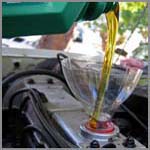Castor oil is possibly the plant oil industry’s most underappreciated asset. It is one of the most versatile of plant oils, being used in over many diverse industries. Due to its unique chemical structure, castor oil can be used as the starting material for producing a wide range of end-products. The castor plant itself requires relatively less fertilizers, pesticides, water and maintenance than most other cultivated crops, and it can grow in marginal land.
Castor oil is obtained by pressing the seeds, followed by pressing the cake or solvent extraction of the cake. This oil is unique among vegetable oils and uniqueness is derives from the presence of a hydroxyl fatty acid known as ricinoleic acid (12‐hydroxyl‐cis‐9‐octadecenoic acid) which constitute around 90% of the total fatty acids of the oil. Castor Oil is also distinguished from other vegetable oils by its high specific gravity, thickness and hydroxyl value.
Castor Oil is a Natural Oil Polyol-There is no substitute in nature for its unique Biochemical structure.
Castor Oil and Castor derivatives are Bio-Renewable, Bios stainable and where necessary Bio-Degradable.
| AGRICULTURE |
 |
|
| Food |
 |
|
| TEXTILE CHEMICALS |
 |
|
| PAPER |
 |
|
| PERFUMERIES |
 |
|
| TELE- COMMUNICATIONS |
 |
|
| PLASTICS & RUBBER |
 |
|
| COSMETICS |
 |
|
| Polyurethanes |
 |
|
| PHARMACEUTICALS |
 |
|
| LUBRICANTS |
 |
|
| PAINTS, INKS & ADHESIVES |
 |
|
|